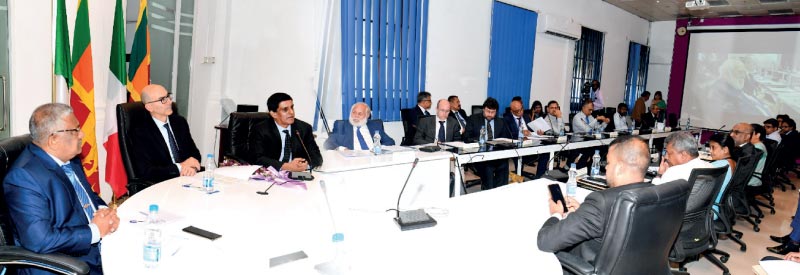Tuesday Feb 24, 2026
Tuesday Feb 24, 2026
Monday, 22 January 2024 00:00 - - {{hitsCtrl.values.hits}}

The Ceylon Italy Blue Economy Association (CIBEA) hosted the inaugural Sri Lanka Forum on Green Hydrogen and E-fuels Bunkering in the Indian Ocean recently, marking a significant step towards a sustainable future for maritime transportation in the region.
The forum, held in Colombo, brought together key stakeholders from both countries to discuss the development of the Trincomalee Net-Zero SEZ and the Italy-Sri Lanka Green Corridor, two ambitious initiatives aimed at establishing Sri Lanka as a global leader in sustainable development and clean maritime fuel transportation.
Ambassador of Italy to Sri Lanka Damiano Francovigh, in his salutation speech highlighted the shared passion for innovation and environmental stewardship that unites Italy and Sri Lanka. He emphasised the importance of the Green Transition Roadmap as a compass for sustainable development, particularly for the Trincomalee Net-Zero SEZ and the Italy-Sri Lanka Green Corridor.
Ceylon Italy Blue Economy Association President Vittorio Coco, a passionate advocate of the project, gave a specific introduction to the strategy envisioned for the initiative, which is going to be implemented in collaboration with the Sri Lanka Ports Authority, the University of Genoa, Italy, and the University of Moratuwa, Sri Lanka.
The proposed plan of action outlined a three-phased approach:
Key considerations for successful implementation include:
The strategic partnership between Sri Lanka and Italy leverages the unique strengths of both nations:
Salutations, live and recorded, and support to the project came also from Minister of Ports, Shipping and Aviation Nimal Siripala de Silva.
The forum delved deeper into the specifics of greening Trincomalee with a series of insightful presentations. FBK, Italy’s top scientific research foundation, set the stage with a keynote address outlining the technological landscape. Experts then tackled crucial topics for the SEZ, from choosing the most suitable technology for hydrogen production to integrating it within port operations and establishing a clean fuel corridor between Genoa and Singapore. Strategic engineering for the project, the potential for sustainable cruise tourism, and eco-friendly landscaping practices were also explored.
Finally, a roundtable based on a report by a University of Genoa academic team provided a platform for local stakeholders to voice their comments and suggestions, ensuring the project is grounded in local needs and concerns.
The successful implementation of the roadmap launched recently has the potential to transform Trincomalee into a global leader in sustainable development and establish the Green Corridor as a model for clean maritime fuel transportation. The Sri Lanka Forum marks a crucial step forward in this journey, uniting diverse stakeholders with a shared vision for a sustainable future.